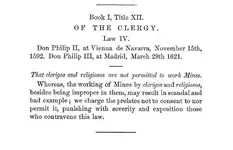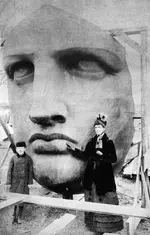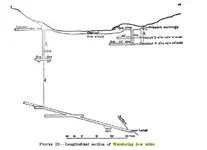Don Jose,
They got that money through loopholes! The Jesuit (like the folks at Enron) have always been "the smartest guys in the room". The Jesuits were quite adept at finding loopholes they could exploit. Here is a perfect example:
There was a Precept issued that said no Jesuit was allowed to play cards. Not wishing to break the rules, but liking to gamble, the Jesuits started sitting behind the people actually playing the cards, and still betting. THEY WEREN'T PLAYING CARDS!
When the higher ups learned about this, they issued a new Precept. No Jesuits were allowed to play cards, nor were now allowed to bet on the card games. Okay. Next, the Jesuits took to sitting behind the players, and telling them what to bet. Whatever they won, they tithed to the Priest. They were neither playing cards, nor were they betting themselves.
That was again followed up by another Precept that forbade Jesuits from having anything to do with gambling or card playing.
The exact same thing happened with mining and businesses for profit. Jesuits take INDIVIDUAL Vows of Poverty. The Jesuit Order (like the rest of the Catholic Church) is quite wealthy. The Church displays its wealth in all its Churches because:
Although in these miserable times opposing opinions have arisen among critics, some praising and others condemning the care and expense of adorning and maintaining the temples with all possible dignity and decency for the reverence due to the Supreme Maker of all creation, I will not enter into a dispute over the subject, but I believe in what Our Mother, the Holy Roman Catholic Church, has always praised, approved, practised, and in a certain fashion glorified in the lives of its Saints. One learns from the lessons of St Ignatius of Loyola, father and founder of the Society of Jesus, when he says in praise of that Holy Patriarch, “Templorum nitor, catechismi traditio, concionum ac Sacramentorum frequentia ab ipso incrementum accepere.”I shall say that my heart rejoices with delight, and I feel more inclined to worship and praise Our Lord when I enter any well adorned church. I must let the admiration argument prevail, a maiori ad minorem [from the highest to the lowest], for if we who are more rational than the Indians find incentive and devotion in temples that outshine others by their glowing adornments and will choose those in preference to the slovenly ones for Mass, Sermon, Confession, and Communion, how much more must the Indians be in need of such stimuli when nothing of what they hear takes hold upon them unless it enters through their eyes with some sort of demonstration of the Supreme Creator about whom the preacher is speaking? So, when they see that the house of God is well ordered, clean, and beautifully adorned, they perceive at once the magnificence of its Owner and Ruler. I praise the missionaries of Sonora for imitating their great Father St. Ignatius.
Father Johan Nentvig SJ from "Rudo Ensayo"
Back to the mining loophole argument:
Jose is correct in asking why did they have to repeat that Cedula/Precept? They didn't repeat it. What started in the 13th Century, kept getting changed as the Jesuits found the loopholes. The final Jesuit Ecclesiastical Precept regarding mining was from 1747:
Rule #4. No one will work mines. This includes the prohibition that no one will have any knowledge about the matter of mining, either directly or indirectly. The intention of the precept is to include all forms of knowledge or interpretations that could even fall within the same precept.
Father Charles Polzer SJ from "Rules and Precepts of the Jesuit Missions of NorthWestern New Spain"
If you read that carefully, you will see that it is a cobbled together from a bunch of older Precepts. Here is a precept from about the time the Jesuits were just getting their ball rolling (1592):

Now, compare that with the 1747 version. You can see that it has been changed several times accounting for loopholes discovered.
Joe,
There is a vast and distinct difference between "
room to do what was required to survive and to continue their work" and having the largest sugar plantations in the New World and being the largest slaveholders in the New World. Also based on what was found in Rio de Janeiro, its not likely their revenue only came from subsistence selling of goods to miners and locals and tithing.
Also, they were never GIVEN ROOM. Look at the card playing example I posted. One precept was made against playing cards. The Missionaries exploited a loophole in the law pronounced by THE CHURCH. When the Church found out the Missionaries had found a loophole, they put out a different Precept that was a bit more specific. When the next loophole was first found, then discovered, the Church issued a new Precept that was even more specific. The Church was issuing Precepts, but the Missionary Fathers kept finding and exploiting the loopholes in those precepts.
Mike









